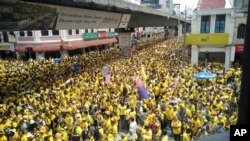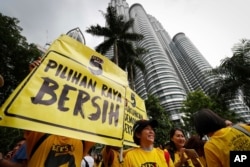Tens of thousands of demonstrators rallied Saturday in the Malaysian capital, Kuala Lumpur, pressing for political reforms as well as clean and fair elections. The gathering was largely peaceful, despite worries beforehand over possible clashes with pro-government supporters.
A sea of yellow shirts, hallmark of the ‘Bersih’ or clean government movement, took over the city’s center. The protest went ahead despite arrests of several leaders including the coalition’s chairperson, Maria Chin Abdullah.
Bersih, founded in 2006, includes a coalition of 62 non-government organizations (NGOs) and has staged five rallies calling for reform of Malaysia’s electoral system and for Prime Minister Najib Razak to step aside amid corruption allegations. Bersih’s secretariat manager was also detained in a police raid marked by the seizure of computers, mobile phones, and documents.
Rights organizations condemned the arrest of protest leaders including Chin, who faces charges of seeking to “commit activity detrimental to democracy”.
Others swept up in the arrests included a member of parliament, a Selangor state politician, and a member of the SUARAM human rights organization.
Amnesty International, in a statement, said the arrests were part of a “series of crude and heavy handed attempts to intimidate Malaysian civil society activists and human rights defenders.”
'Increase in State Oppression'
Political tensions have been building after the Bersih movement launched a national convoy on October 1 promoting the calls for reforms in the lead up to the November 19 rally.
William Case, a political scientist at City University in Hong Kong, said the arrests marked a “very large scale response” by the government.
“The arrests – this is more than an incremental increase in state oppression I would have to say. This is a very large scale response. It’s nearly a sweep. That’s the thing that strikes me today I would have to say,” Case told VOA.
He said the arrests highlighted a willingness by the government to use “the instruments of coercion” especially in the lead up new elections, expected in the next two years. A vote must be held by late August, 2018. However many observers believe the election will come much sooner, perhaps as early as mid-2017, as the government considers holding a poll before political opposition groups are able to unify.
Opposition leader Maria Chin, in a recent VOA interview, accused the government of “reacting in a violent manner” following attacks and threats by pro-Malay “red shirts” on Bersih convoy and rally.
But Chin believed the convoy and protests had made progress in building support ahead of the next national polls.
“The idea that we have this time is different because we are spending seven weeks on the road to talk to the people. So we have made a big difference. We are moving towards the next election. We don’t stop just at the rally, we dont stop at the convoy,” she said.
Director of the Asian Institute at the University of Tasmania, James Chin, says the rally was aimed at testing support for the rallies by the opposition ahead of national elections.
Fears of violence by pro-Malay ‘red shirt’ supporters failed to be realized. A key red shirt leader, Jamal Mohamaf Yunos, who had threatened tens of thousands of red shirt protestors to challenge the Bersih rally, was himself detained by authorities.
Chin said the government had distanced itself directly from the red shirts, as well as seeking to gauge support for Bersih movement with the arrests aimed at appearing fair to both groups.
“What the government is trying to do, the government is playing both sides. Cracking down on both sides appears fair.”
“But essentially the government in some ways also wanted this rally to go ahead because they are not very sure of the Malay community towards [former Prime Minister] Mahathir [Mohamad] so they want to check how influential he is,” he said.
Mahathir has led a campaign against Prime Minister Najib over accusations the national leader had diverted over $3.5 billion from the state-run 1 Malaysia Development Berhad (1MDB) fund.
Najib says he is not guilty of the charges, saying the funds had been dealt with properly and were a “genuine donation” from Saudi Arabia.
Mahathir and his wife attended Saturday’s rally, with the former leader telling Malaysian media he welcomed the crowd support for the Bersih group despite, what he termed, “the current situation.”
“We no longer live under democracy but a kleptocracy - a nation ruled by thieves,” he said.
Mahathir is leading a breakaway party from the governing United Malays National Organization (UMNO), in power in Malaysia since independence in 1957.
The new party hopes to challenge the pro-Islamic PAS Party and UMNO especially in the rural electorates banking in securing Malay support at the next general election.






